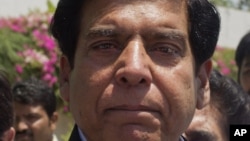Pakistan's ruling party has nominated another controversial figure to replace ousted Prime Minister Yousuf Raza Gilani, as the country copes with a political crisis.
The Pakistan People's Party selected former water and power minister Raja Pervez Ashraf, who has been hit with corruption allegations and is partly blamed for the electricity crisis in the country.
Parliament will meet on Friday to elect the new prime minister. Ashraf is expected to be approved because the Pakistan People's Party holds a majority in parliament with its coalition partners.
The party previously nominated the textiles minister, Makhdoom Shahabuddin, for the prime minister's post. But a Pakistani judge issued an arrest warrant Thursday for Shahabuddin in connection with a scandal involving illegal imports of the drug ephedrine during his time as health minister.
Pakistan's political crisis was sparked by the Supreme Court's decision Tuesday to declare Gilani ineligible for office because of a prior conviction. The court had found him guilty of contempt after he refused its order to ask Swiss authorities to investigate claims of corruption against President Asif Ali Zardari.
The court's move this week was a blow to Zardari’s government, already struggling with rolling blackouts, unemployment, militant attacks and a tense relationship with the United States.
It was the first time Pakistan's Supreme Court has forced the removal of a standing prime minister.
Supporters of the court, including the political opposition, have welcomed the stand against what they believe is a corrupt and ineffective government. But others feel the Supreme Court is overstepping its boundaries and doubt that the election of a new prime minister will end the standoff.
Pakistan's new prime minister will likely face the same pressure to investigate President Zardari.
Some information for this report was provided by AP, AFP and Reuters.
The Pakistan People's Party selected former water and power minister Raja Pervez Ashraf, who has been hit with corruption allegations and is partly blamed for the electricity crisis in the country.
Parliament will meet on Friday to elect the new prime minister. Ashraf is expected to be approved because the Pakistan People's Party holds a majority in parliament with its coalition partners.
The party previously nominated the textiles minister, Makhdoom Shahabuddin, for the prime minister's post. But a Pakistani judge issued an arrest warrant Thursday for Shahabuddin in connection with a scandal involving illegal imports of the drug ephedrine during his time as health minister.
Pakistan's political crisis was sparked by the Supreme Court's decision Tuesday to declare Gilani ineligible for office because of a prior conviction. The court had found him guilty of contempt after he refused its order to ask Swiss authorities to investigate claims of corruption against President Asif Ali Zardari.
The court's move this week was a blow to Zardari’s government, already struggling with rolling blackouts, unemployment, militant attacks and a tense relationship with the United States.
It was the first time Pakistan's Supreme Court has forced the removal of a standing prime minister.
Supporters of the court, including the political opposition, have welcomed the stand against what they believe is a corrupt and ineffective government. But others feel the Supreme Court is overstepping its boundaries and doubt that the election of a new prime minister will end the standoff.
Pakistan's new prime minister will likely face the same pressure to investigate President Zardari.
Some information for this report was provided by AP, AFP and Reuters.





